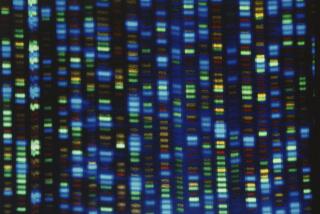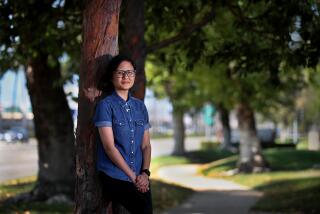Public health enemy
- Share via
Re “Who will survive the hungry gene?” Opinion, Aug. 30
Greg Critser’s otherwise informative article on Type 2 diabetes is marred by a misunderstanding of evolution. Type 2 diabetes does not, in fact, confer an evolutionary disadvantage on those people carrying the gene, and that is why it is such a public health problem today.
Even though it is appearing earlier in life than it used to as childhood obesity explodes in our population, Type 2 diabetes rarely causes illness before middle or old age, after the reproductive years are over. Type 2 diabetics have children just as their unaffected peers do. Those children often carry the gene and go on to become Type 2 diabetics themselves.
I believe that Critser will have to search for another reason why Europeans have less Type 2 diabetes than Americans, such as the fact that they are also less obese than we are.
David Hurwitz
Calabasas
If Darwinism explains diabetes, it is unlikely that a California diabetes czar can do much about it. While I understand there is a genetic factor involved, my own Type 2 diabetes resulted from a lifetime of bad eating habits and my failure to run two miles every morning.
Orders from the California diabetes czar are unlikely to change that, or will not be able to penetrate the clutter coming from the cardiovascular emperor, the king of fat, the dear leader of kidney failure and the cancer Caesar.
All children should not be forced to learn how to use blood glucose meters (or how to connect themselves to a dialysis machine). Their time would be better spent in gym class and learning good eating habits.
Richard E. Ralston
Newport Beach
The writer is executive director of Americans for Free Choice in Medicine.
Re “Diabetes diagnoses rise in the state,” Aug. 23
As the founder of the Food Empowerment Project, I thank you for sharing the results of Dr. Allison L. Diamant’s research regarding the rise of diabetes diagnoses in California.
Noting that the fast-food diet and lack of exercise in the U.S. have dire effects on immigrants and their children is not surprising, but what is even more disturbing is the fact that healthy foods are rarely available in low-income areas.
Having access to nutritious food should be a right, not a privilege, and we all need to create a more just and sustainable world by recognizing the power of our food choices and how those choices affect people, animals and the environment.
Iauren Ornelas
San Jose






